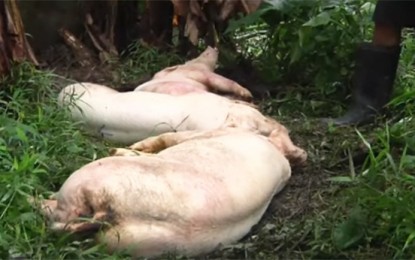Bacolod City – The Bacolod Sangguniang Panlungsod is requesting the City Veterinary Office to conduct intensified testing and monitoring of live hogs within the jurisdiction of Bacolod City to curtail the spread of African Swine Fever (ASF).
The resolution authored by Councilor Claudio Puentevella said that on May 26, Bacolod City logged the first two swine fever cases within its territorial jurisdiction.
Intensified testing of live hogs among hog breeders and hog raisers will help curtail and prevent the spread of ASF within the City of Bacolod and protect the pork industry of the city, it said.
Meanwhile, the SP also passed a resolution yesterday requesting the City Veterinary Office, through Mayor Alfredo Abelardo Benitez, to intensify border inspections of inbound pork products and live hogs within the jurisdiction of Bacolod City, also to curtail the spread of ASF.
The resolution authored by Puentevella said African Swine Fever is a highly contagious viral disease of domestic and wild pigs, whose mortality rate can reach 100 percent.
The ASF virus is a large, double-stranded DNA virus in the Asfarviridae family. It is the causative agent of African swine fever. The virus causes a hemorrhagic fever with high mortality rates in domestic pigs, it said.
So, intensified border inspection of inbound pork products and live hogs can control and prevent the spread and transmission of ASF within Bacolod City in order to protect the city’s pork industry, the resolution added.
Meanwhile, following the detection of the African Swine Fever (ASF) virus last week in Brgy. Taculing, Bacolod City, ASF was detected by the Agriculture Department’s Bureau of Animal Industry (BAI), in Brgy. Mabini, Pulupandan, Negros Occidental, as local hog raisers seek national government to immediately address the spread of the virus.
While he has yet to see the official report of BAI confirming an ASF case in Pulupandan, Gov. Eugenio Jose Lacson said that the provincial government has already initiated measures in compliance with BAI protocols.
We will isolate the 500-meter area where the pig tested positive for the ASF virus, for a 15-day observation period, Lacson said.
There is no culling, only isolation during the 15-day observation period, he stressed.
If there is no repeat of such incident, then we can say that such incident is isolated. If there is, we will continue to proceed implementing BAI protocols, Lacson further said.
Ric Lauron, president of the Alliance of Hog Raisers Association in Negros Occidental (AHRANO), in an interview with Aksyon Radyo, said they are asking for immediate intervention from the government, including financial assistance, as majority of the affected are backyard hog raisers.
During the Negros Occidental Sangguniang Panlalawigan hearing on Tuesday, Lauron said the establishment of border controls by local government units is not enough to contain the spread of ASF virus, as they recommended to preserve the areas categorized as “green zones”, and the conduct of massive disinfection and vaccination.
As of May 30, Negros Occidental has logged 7,229 swine mortalities, with the damage to the hog industry in the province pegged at P93,180,675, according to reports of the Provincial Veterinary Office.
With regard to swine mortalities, mostly attributed to hog cholera and other diseases, the towns of San Enrique and Valladolid are among the most affected LGUs.
On Tuesday, an additional 455 hog deaths were recorded by PVO, with an estimated value of P4.9 million.
Lacson said there should be no rush in declaring the province as ASF infected, since of the four samples taken from hogs in Pulupandan, only one tested positive.
“We are not sitting down and letting it happen. We are doing protocols in avoiding the spread of the virus, whatever they maybe,” he added.
ASF cases have also been detected in Dauin and Sibulan towns of nearby Negros Oriental.
Gov. Gwendolyn Garcia has ordered the temporary ban on entry of live hogs, piglets and pork related products from Negros Occidental to Cebu, due to the detection of ASF virus in the province.
Lacson said that affected hog raisers may also qualify for assistance from the Department of Social Welfare and Development, through its AICS (Assistance to Individuals in Crisis Situation) program.
With this development, he also said that they are not yet encouraging hog re-population. But they will concentrate on poultry by distributing free-range chickens. (Chrysee Semillano | Gilbert Bayoran via The Visayan Daily Star (TVDS), photo courtesy of TVDS)

